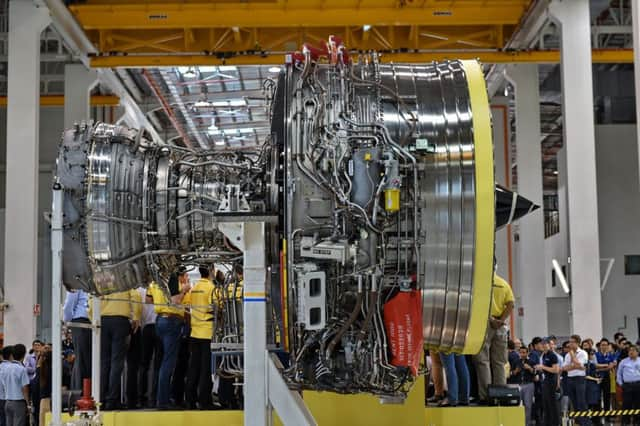Strong pound to knock Rolls-Royce sales


The alert came as the group revealed it has already shed some 1,300 staff as part of its plan to combat tougher economic conditions as customers opt to delay or cancel orders.
The company, which has major Scottish bases in East Kilbride and Inchinnan, said the majority of the jobs have come from its UK and US workforces. It employs 25,000 staff in Britain and 55,000 worldwide. The move is part of the firm’s strategy, announced in November last year, to cut a total of 2,600 jobs over the next 18 months.
Advertisement
Hide AdAdvertisement
Hide AdIn March, Rolls said that 187 posts would go at its facility in Inchinnan, and another 31 jobs would be lost from its East Kilbride plant.
The group said yesterday that most of the remaining 1,300 cuts will be made this year, and will again largely fall on UK and US staff in its aerospace divisions.
Most of the UK losses came at its Derby civil aerospace site, which employs 12,000 staff, and its Bristol plant, which employs 3,500 in defence engineering roles. A spokesman for Rolls-Royce said the job losses include engineers and administrators.
In February, Rolls reported its first fall in revenues for a decade as underlying sales for 2014 fell 6 per cent to £14.6 billion, hit by defence spending cuts and falling commodity prices. Underlying profits were 8 per cent lower at £1.62bn over the same period.
The firm said it was opening more efficient plants in the UK, which needed fewer people to run them. This year it opened a factory in Rotherham which manufactures turbine blades and launched a site in Bristol to develop carbon fibre fan blades.
Rolls also told investors yesterday that it faces a £350m knock to its sales this year because of the strong pound.
In a trading update to coincide with its annual shareholder meeting, the group said: “Compared with 2014, average rates for sterling have weakened against the US dollar but strengthened against the euro and the Norwegian kroner.
“If rates remain at the average levels seen so far in 2015, these movements would be broadly offsetting for earnings. However for revenue, we would expect a roughly £350m reduction from translation.”
Advertisement
Hide AdAdvertisement
Hide AdHowever, the group does not expect these foreign exchange translations to affect its annual profits, which are forecast to come in at about £1.5bn.
Last month Rolls was buoyed by its biggest-ever order when Dubai-based airline Emirates signed a contract worth $9.2bn (about £6bn) for Trent engines to power 50 Airbus A380 super jumbos that will enter service from 2016.
The order will secure jobs across the group’s supply chain, which stretches from Bristol in south-west England to Scotland. As well as Inchinnan, Rolls-Royce sites involved in production of the Trent 900 engine include Ansty in Warwickshire, Barnoldswick in Lancashire, Bristol, Derby, Hucknall in Nottinghamshire and Sunderland.
Rolls also announced last month that chief executive John Rishton had decided to stand down as of 2 July after more than four years in charge of the engineering group.
Rishton will be replaced by Warren East, who left chip designer Arm Holdings in 2013 after almost 12 years at the helm, during which time he is seen as having transformed it into a global firm responsible for the technology behind nearly all mobile phones and many other electronic devices.
Rolls is scheduled to report its first-half results on 30 July, and the company said yesterday that it expects performance to be weighted towards the second half of the year.
The FTSE 100 company added: “In aerospace, deliveries of Trent XWB engines will ramp up. In land and sea, as expected, trading continues to be affected by lower oil prices and has therefore started more slowly than in 2014.”